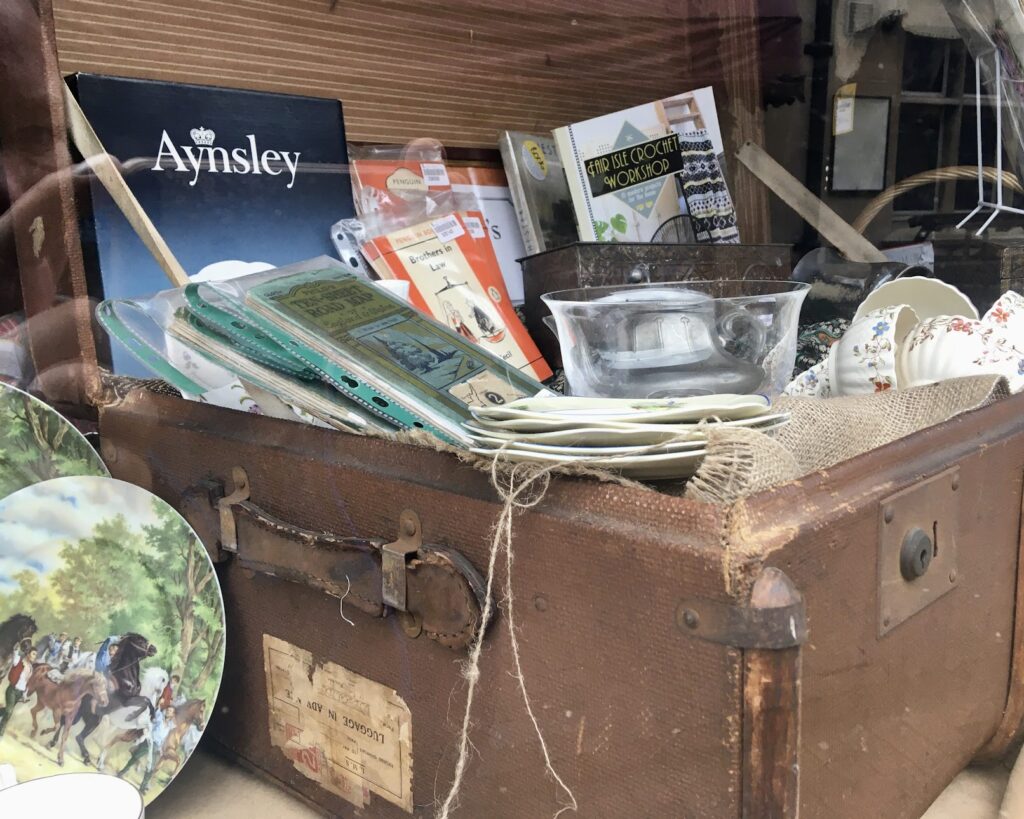This Week’s Bit of String: The adventures of Bugs and Daffy
Bugs Bunny and Daffy Duck have it easy these days. They lie about in a languid knot near the pillows of my kid’s empty bed. In years past, they were subjected to all sorts of wrestling matches. They even had a go at cheese rolling; after a family outing to this inimitable Gloucestershire tradition, our Bear was inspired to throw a Baby Bel cheese down the stairs, and toss stuffed animals such as Bugs and Daffy after it, keeping score of who got closest.
When Bear started secondary school, and we reorganised their bedroom, I asked if we should thin out the crowd of stuffies huddling at the foot of their bed. “But they’re my friends!” objected Bear.
This didn’t last forever of course, and for the latter teen years, there were only three stuffies on the bed. Bugs, Daffy, and an old one of mine, Barney T. Moose (the T stands for “the,” of course). When Bear moved across the ocean, Barney went with them. Bugs and Daffy are holding down the fort, so to speak, and the other “friends” are in a very close-knit, backroom box-dwelling community.

Great emotional upheaval precedes a clear-out. I don’t know if it’s actual grief for previous incarnations of my little Bear, or if it’s the anxiety that grief will come. But I always end up so busy that after each massive overhaul, whatever I’ve boxed up does not prey on my mind. I don’t step into their vacant room and mourn the fact that Brown Puppy and Big Baby aren’t still on the bed. Not most days. I accept that life moves on.
Ruthless
These are the sorts of things I tell myself when another editing session looms. Bits I’m fond of will get boxed away. I’ll feel anxious as I cut and paste lines I like from my manuscript into my Rejected Quotes file.
But when I go into this file, I see segments pared from the last edited piece, a year or two ago. I’ve never developed them further. I forgot they existed. Yes, they’re good lines, but by now the story’s already made it into a magazine or anthology without them.
For me, preserving cut lines doesn’t actually benefit future work. It just enables me to feel ok about removing them from the current one. It’s like a little security teddy to cling to while I do the scary revision.
Have you ever turned cut lines or ideas from one story into a whole new project? Maybe I’m just not organised enough.
We are told to “kill our darlings” when editing. Don’t get too attached to passages you crafted, because they might not turn out to be relevant to your story’s core. Simply being well-written and liked by the author doesn’t justify being in a story. I’ve written recently about making writing fun, about throwing things in like a library scene or a favourite snack or song… those things can help keep us writing, but we can’t necessarily keep them in our writing. Sometimes temporary aids or fixes are an essential but impermanent part of the work.
It’s like growing up, isn’t it? The threadbare stuffed animals, the books read down to raggedness, the forays into sports or music. For a while we think we couldn’t live without them, but they may be less vital as we discover who we ultimately are.
Balance
I’m currently editing my manuscript for The Gospel of Eve. It’s hard to put a number on the edits because there are certain parts that I’ve gone over and adjusted countless times. As a whole, it’s the fourth comprehensive, planned revision.

Usually with my first big edit, I have an eye on the word count. I can’t help it. I get so worried about excess weight, I’m seeing what I can cut. With the second, I firm up characters’ trajectories. Then I have to go through again and see if it makes sense, given everything I’ve trimmed out. This time, I am again checking it coalesces around a theme.
I seem to swing from trying to cut, then needing to add… And all the while I’m wishing someone would tell me what’s right. Am I overexplaining, or being too cryptic? Introducing too many characters too fast in my rush to kick off the action? It can be so lonely, trying to get it right with no guide.
Rather like parenting. Not that books are where near as important as people, but the creation process has its similarities to parenting. How much do we push and lead, how much do we let our kids take their time and figure things out on their own? This happens to be a central issue of my book. Eve, as the first mother with only a sometimes-terrifying God as parental model, tries to discern how much freedom to allow her children, unsure how much she really has herself.
How do you go about editing, and capturing nothing more or less than the most important part of the story?